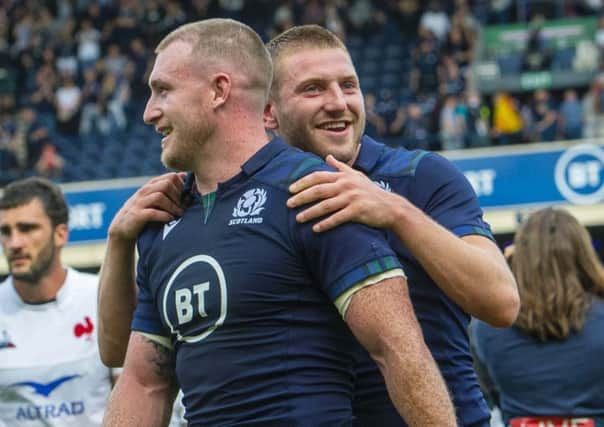Allan Massie: Gregor Townsend’s Scotland selection should maintain the winning habit


Interception tries reveal how our loyalties corrupt our judgment. When a try is conceded because a pass has been intercepted, it is always because our man has made a mistake in passing. When we score an interception try it’s because our man has read the play brilliantly, as Finn Russell did at Twickenham and also at Murrayfield where his interception of Joey Carberry’s pass set up Sam Johnson’s first try for Scotland.
Last Saturday was satisfying. We fell behind and came back to win a hard and difficult match – satisfying though not entirely satisfactory, because we might, and probably should, have scored more than seven points in the second half.
Advertisement
Hide AdAdvertisement
Hide AdWinning and losing can both, as I’ve often remarked, become habits. That’s why it’s good that Gregor Townsend’s selection for today’s match in Tbilisi has evidently been made with a view to winning, preferably handsomely, and not as a final examination of candidates for the last places in the World Cup squad. That’s why Russell, Greig Laidlaw, Stuart McInally and Hamish Watson are all playing.
These are four who – fingers crossed – are surely certain to start against Ireland, as, I would guess, are half a dozen others in today’s team and Stuart Hogg who has been given the week off. There is intense competition in the centre and the back row, but I would be surprised if Johnson and John Barclay aren’t in the XV against Ireland.
Elsewhere last weekend, England at Twickenham were frighteningly effective in their demolition of an under-cooked and lacklustre Ireland. By one count Ireland missed at least 35 tackles. This is a barely credible figure, but not one we should look to see repeated when we meet them in Japan. For one thing we don’t have powerful players like Billy Vunipola, Manu Tuilagi and Joe Cokanasiga who burst through tackles or trample over tacklers. There are still obvious weaknesses in this England XV, especially in defence. If Eddie Jones fields the same back three – Elliot Daly, Cokanasiga and Johnny May – against France and Argentina, their evident uncertainty under the high ball will surely be exploited by such intelligent fly-halves as Camille Lopez and Nicolas Sanchez. Nevertheless it looks as if Jones is getting his selection mostly right, and England, as usual, looked a better side with George Ford at 10 and Owen Farrell at 12 than they ever have when Farrell is at fly-half – this being the case even though Ben Youngs had a pretty poor game, despite getting the sort of ball that any scrum-half might dream of getting.
Ireland surely can’t be as bad again.Their warm-up against Wales today may not tell us much. Joe Schmidt has made 11 changes, most of which he might have made anyway, while Warren Gatland has named what is very much his second XV. Still the Twickenham debacle seemed to confirm the impression, formed during the Six Nations, that Ireland are not as good as they were a year or 18 months ago. Things may look better when Keith Earls, their brightest star in the spring, and Jonny Sexton return, even though Sexton hasn’t been that impressive for some time now.
Ireland will undoubtedly have improved by the time they arrive in Japan, but it is not, I hope, tempting fate to suggest that our chance of beating them there looks better than it did a few months ago. Meanwhile, their present uncertainty serves to remind us that coaches are only as good as their team’s performance and results. When Ireland were riding high and winning against the All Blacks, Joe Schmidt was “the best coach in the world”. Now one finds Irish fans saying he is still a great coach but a poor selector. Given that getting selection right, whether for club or country,is arguably the most important part of a coach’s job , there’s an internal contradiction here.
The coach is there to make the most of the material he has and to do all that is possible to give his side its best chance of winning. But it’s the players themselves who win or lose matches, not the coach. The responsibility lies ultimately with the men on the field, not with the man in the stand with notebook or laptop.